De Finse schrijver Kjell Westö werd geboren op 6 augustus 1961 in Helsinki. Zie ook alle tags voor Kjell Westö op dit blog.
Uit: The perils of being Skrak (Vertaald door David McDuff)
“At the time of Werner’s stay in Cleveland Bruno and Maggie had already been divorced for some years, and in an irreconcilable manner. But they were still interested in their grown-up son, each in their own way; Maggie wrote often, and Werner replied, he wrote at length, and truthfully, for he knew that Bruno and Maggie no longer communicated; to Maggie he could admit that he hated corporate law and bookkeeping, and to her he dared to talk about the raw music he had found on the radio station WJW, he wrote to her that the music of the blacks had body and that he had found a great record store, it was called Rendezvous and was situated on Prospect Avenue and there he had also bought a ticket for a blues concert, wrote Werner, he thought that Maggie would understand.
Bruno was not a great letter-writer, he sometimes dropped a line to Joe McNab on abrupt postcards in which he asked Joe to report on his son’s progress in his studies, that was all. On the other hand, he sometimes telephoned, transatlantically and intercontinentally, it was a complicated and expensive and easily interrupted procedure that most often consisted of father and son being silent together at a distance of almost 10,000 kilometres from each other.
When Bruno discovered by letter that his son, the Latin scholar and athlete and student of law, had by some strange means got hold of a ticket for a Negro concert and had also used it, he immediately booked an international call to McNab. When the call came through it was afternoon in Helsinki and early morning over there in Cleveland. After some preliminary questions and laconic replies and a period of silence accompanied by cosmic crackling and the roar of the mighty Atlantic between them, Bruno came to the point: ‘I’m not paying for you to stay over there to be beaten up by Negroes, Werner,’ he said. Werner was silent, then he said: ‘So Uncle Joe has been gossiping.’ ‘I wouldn’t call it gossiping,’ retorted Bruno. ‘You live with him, he’s responsible for you.’ ‘I’m a grown man, Dad,’ said Werner bitterly.”
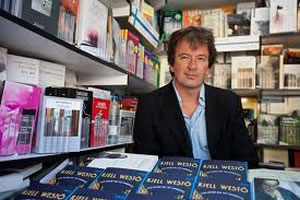
De Amerikaanse dichteres en schrijfster Diane DiPrima werd geboren op 6 augustus 1934 in New York. Zie ook alle tags voor Diane DiPrima op dit blog.
An Exercise in Love
for Jackson Allen
My friend wears my scarf at his waist
I give him moonstones
He gives me shell & seaweeds
He comes from a distant city & I meet him
We will plant eggplants & celery together
He weaves me cloth
Many have brought the gifts
I use for his pleasure
silk, & green hills
& heron the color of dawn
My friend walks soft as a weaving on the wind
He backlights my dreams
He has built altars beside my bed
I awake in the smell of his hair & cannot remember
his name, or my own.
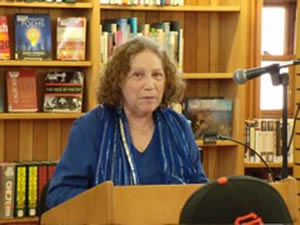
Diane DiPrima (New York, 6 augustus 1934)
De Engelse dichter Alfred, Lord Tennyson werd geboren op 6 augustus 1809 in Somersby, Lincolnshire, England. Zie ook alle tags voor Alfred Tennyson op dit blog.
Come not when I am dead
Come not, when I am dead,
To drop thy foolish tears upon my grave,
To trample round my fallen head,
And vex the unhappy dust thou wouldst not save.
There let the wind sweep and the plover cry;
But thou, go by.
Child, if it were thine error or thy crime
I care no longer, being all unblest:
Wed whom thou wilt, but I am sick of Time,
And I desire to rest.
Pass on, weak heart, and leave to where I lie:
Go by, go by.
Late, Late, So Late
Late, late, so late! and dark the night and chill!
Late, late, so late! but we can enter still.
Too late, too late! ye cannot enter now.
No light had we: for that we do repent;
And learning this, the bridegroom will relent.
Too late, too late! ye cannot enter now.
No light: so late! and dark and chill the night!
O, let us in, that we may find the light!
Too late, too late: ye cannot enter now.
Have we not heard the bridgegroom is so sweet?
O, let us in, tho’ late, to kiss his feet!
No, no, too late! ye cannot enter now.”
Move Eastward, Happy Earth
Move eastward, happy earth, and leave
Yon orange sunset waning slow:
From fringes of the faded eve,
O, happy planet, eastward go:
Till over thy dark shoulder glow
Thy silver sister world, and rise
To glass herself in dewey eyes
That watch me from the glen below.
Ah, bear me with thee, lightly borne,
Dip forward under starry light,
And move me to my marriage-morn,
And round again to happy night.
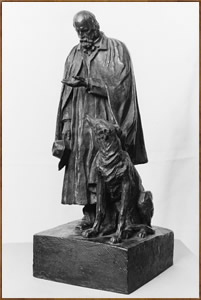
Beeld door George Frederick Watts
De Franse dichter, schrijver en diplomaat Paul Claudel werd geboren op 6 augustus 1868 in Villeneuve-sur-Fère. Zie ook alle tags voor Paul Claudel op dit blog.
La Vierge à midi
Il est midi. Je vois l’église ouverte. Il faut entrer.
Mère de Jésus-Christ, je ne viens pas prier.
Je n’ai rien à offrir et rien à demander.
Je viens seulement, Mère, pour vous regarder.
Vous regarder, pleurer de bonheur, savoir cela
Que je suis votre fils et que vous êtes là
Rien que pour un moment pendant que tout s’arrête.
Midi !
Être avec vous, Marie, en ce lieu où vous êtes.
Ne rien dire, regarder votre visage,
Laisser le cœur chanter dans son propre langage.
Ne rien dire, mais seulement chanter parce qu’on a le cœur trop plein,
Comme le merle qui suit son idée en ces espèces de couplets soudains.
Parce que vous êtes belle, parce que vous êtes immaculée,
La femme dans la Grâce enfin restituée,
La créature dans son honneur premier et dans son épanouissement final,
Telle qu’elle est sortie de Dieu au matin de sa splendeur originale.
Intacte ineffablement parce que vous êtes la Mère de Jésus-Christ,
Qui est la vérité entre vos bras, et la seule espérance et le seul fruit.
Parce que vous êtes la femme, l’Eden de l’ancienne tendresse oubliée,
Dont le regard trouve le cœur tout à coup et fait jaillir les larmes accumulées.
Parce qu’il est midi, parce que nous sommes en ce jour d’aujourd’hui,
Parce que vous êtes là pour toujours,
Simplement parce que vous êtes Marie,
Simplement parce que vous existez,
Mère de Jésus-Christ, soyez remerciée !
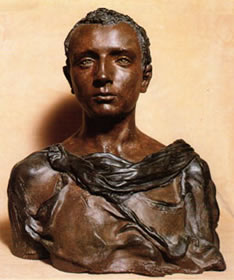
Sculptuur van een jone Claudel door zijn zus Camille
De Algerijnse schrijver Yacine Kateb werd geboren op 6 augustus 1929 in Zighout-Youcef. Zie en ook alle tags voor Yacine Kateb op dit blog.
Uit:Nedjma
„Mustapha tourne le dos à Mourad, et s’assied sur un ponton… «Elle était revêtue d’une ample cagoule de soie bleu pâle, comme en portent depuis peu les Marocaines émancipées ; cagoules grotesques ; elles escamotent la poitrine, la taille, les hanches, tombent tout d’une pièce aux chevilles ; pour un peu, elles couvriraient les jambelets d’or massif (la cliente en portait un très fin et très lourd)… Ces cagoules dernier cri ne sont qu’un prétexte pour dégager le visage, en couvrant le corps d’un rempart uniforme, afin de ne pas donner prise aux sarcasmes des puritains… Elle m’a parlé en français. Désir de couper les ponts en me traitant non seulement comme un commissionnaire, mais comme un mécréant, à qui l’on signifie qu’on n’a rien de commun avec lui, évitant de lui parler dans la langue maternelle. Pas voulu que je l’accompagne en tramway… Le couffin n’était pas si lourd… J’aurais pu la suivre jusqu’à la villa, si elle ne m’avait vu au moment de descendre ; du tramway, je l’ai vue gravir un talus, disparaître ; puis mon regard s’est porté au sommet du talus. Elle avait ôté sa cagoule ; je l’aurais reconnue entre toutes les femmes, rien qu’à ses cheveux… » Mustapha interrompt sa rêverie, sans quitter le ponton, le regard attiré par l’eau. La nuit tombe ; Mourad n’a pas fini de parler ; il dit qu’il était le seul des trois à se trouver tantôt à la gare… Voyant Rachid s’approcher à son tour du ponton, Mourad gaffe encore, avec une sorte d’insistance :
— je ne peux expliquer décidément ce que le voyageur avait de ridicule et d’attristant ; c’était peut-être, comme Mustapha, un collégien en rupture de ban…“
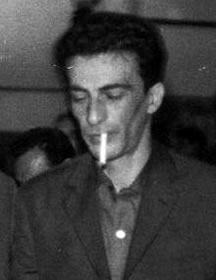
Zie voor de schrijvers van de 6e augustus ook mijn blog van 6 augustus 2011 deel 1 en eveneens deel 2 en ook deel 3.
